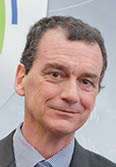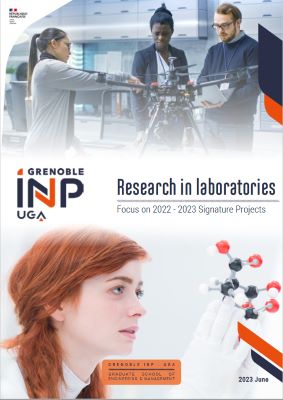 The aim of the Hydro’like chair inaugurated by Alstom and the Grenoble INP partner foundation on 9 October 2014 is to design the hydraulic machines of the future. With a budget of one million euros, it will coordinate the works of 6 joint laboratories between Grenoble INP, Joseph Fourier University and CNRS* (French National Scientific Research Centre). As the leading source of renewable energy, hydro-electricity is currently experiencing rapid growth with a largely untapped energy resource potential in Africa, Asia and South America. In addition, it plays an essential role in regulating the power grid to allow the development of intermittent energies such as wind power and solar energy. As a result, it is now necessary for hydraulic turbines to be able to quickly adapt to the widest variety of power levels on the power grid. This need for heightened flexibility requires fostering the emergence of innovative ideas and concepts while developing multi-disciplinary research that combines diverse fields such as hydraulics, mechanical engineering, materials, automatic control engineering, electrical engineering and sensors. Hydro’like is also a major stepping stone to Alstom’s Hydraulic Machines Centre of Excellence which considers this technology as a highly promising market. With a 5-year budget of 47 million euros, this centre will also include the creation of a shared platform open to partners such as Grenoble INP, the funding of the collaborative R&D project Innov'Hydro, as well as the construction of buildings and the acquisition of equipment for the hydraulic platform.
The aim of the Hydro’like chair inaugurated by Alstom and the Grenoble INP partner foundation on 9 October 2014 is to design the hydraulic machines of the future. With a budget of one million euros, it will coordinate the works of 6 joint laboratories between Grenoble INP, Joseph Fourier University and CNRS* (French National Scientific Research Centre). As the leading source of renewable energy, hydro-electricity is currently experiencing rapid growth with a largely untapped energy resource potential in Africa, Asia and South America. In addition, it plays an essential role in regulating the power grid to allow the development of intermittent energies such as wind power and solar energy. As a result, it is now necessary for hydraulic turbines to be able to quickly adapt to the widest variety of power levels on the power grid. This need for heightened flexibility requires fostering the emergence of innovative ideas and concepts while developing multi-disciplinary research that combines diverse fields such as hydraulics, mechanical engineering, materials, automatic control engineering, electrical engineering and sensors. Hydro’like is also a major stepping stone to Alstom’s Hydraulic Machines Centre of Excellence which considers this technology as a highly promising market. With a 5-year budget of 47 million euros, this centre will also include the creation of a shared platform open to partners such as Grenoble INP, the funding of the collaborative R&D project Innov'Hydro, as well as the construction of buildings and the acquisition of equipment for the hydraulic platform. * LEGI, SIMAP, GSCOP, GIPSA Lab, 3SR, LCIS
Olivier Métais, occupant of the Hydro’like chair, professor at Grenoble INP – Ense3 and researcher at LEGI
SUMMARY
- Imagining the hydraulic machines of the future
- Hydroelectricity: an energy of the future
- Innov'hydro: a multi-disciplinary project
- "We will not be the best on our own"
- Tidal turbines in rivers and at sea
- LCIS transforms RFID labels into sensors
- Micro hydropower plants to provide rural areas with electricity





